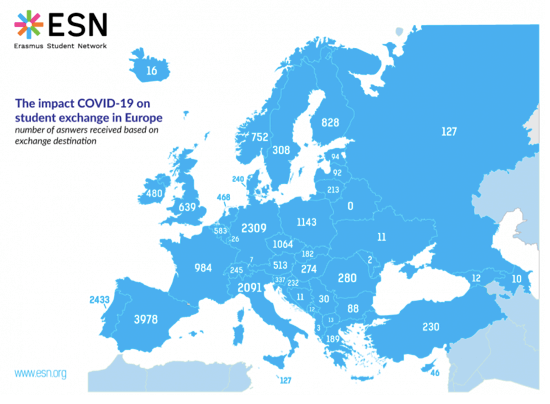A recently-released report by the Erasmus Student Network (ESN) –  Student Exchanges in Times of Crisis – sheds light on the evolving impact of the COVID-19 outbreak on credit-mobile students in Europe, and on their specific mobility experiences. The report builds on an online survey that was run between 19 and 30 March 2020, and which gathered 21 930 responses from credit-mobile students all over Europe.
Student Exchanges in Times of Crisis – sheds light on the evolving impact of the COVID-19 outbreak on credit-mobile students in Europe, and on their specific mobility experiences. The report builds on an online survey that was run between 19 and 30 March 2020, and which gathered 21 930 responses from credit-mobile students all over Europe.
Both international exchange students who were abroad during the spring semester 2020, or who were supposed to be on an exchange, but had their studies interrupted, were covered, as follows: 97.0% were students that were on exchange for the spring semester 2020 (14 053; 64.1%) or for the full academic year 2019-2020 (7 210; 32.9%). Some 2.4% were students that planned to start their exchange during summer or autumn 2020, but saw their exchange as potentially threatened by the health crisis.

Here are some of the key findings:
- For almost two-thirds of respondents, their mobility experience continued (65%). For about a quarter the exchanges were cancelled, and the remaining 5% were unsure about what was to happen.
- The proportion of students who have stayed in their exchange destination decreased slowly during the time that the survey was open. Initially, 41.8% decided to stay in their host country, while 40% decided to return home; 5.2% were undecided at the moment of completing the survey, and 3.6% indicated that they were unable to return home. Last, 7.8% of the respondents said that they were unable to start their exchange.
- 37.5% of the students experienced at least one major problem related to their exchange: most often loss of transportation to return home, followed by problems with accommodation and problems with access to basic needs, such as food and sanitary products.
- Worryingly, 24% of Italian students and 19% of Asian students experienced discrimination based on their nationalities, either to a great extent or to a very great extent.
- 7% of the students reported that they will not get any grant at all for their studies. 24% reported that they will keep the grant, partially or fully. The majority of students said they did not know what will happen to their grants.
- Half of the students whose mobility continued have moved to online classes. 34% of them have moved to partial online or partially postponed classes.
- Three-quarters of the students whose mobilities were cancelled got support from their home institutions, most often with course schedules.
![]() Student Exchanges in Times of Crisis – sheds light on the evolving impact of the COVID-19 outbreak on credit-mobile students in Europe, and on their specific mobility experiences. The report builds on an online survey that was run between 19 and 30 March 2020, and which gathered 21 930 responses from credit-mobile students all over Europe.
Student Exchanges in Times of Crisis – sheds light on the evolving impact of the COVID-19 outbreak on credit-mobile students in Europe, and on their specific mobility experiences. The report builds on an online survey that was run between 19 and 30 March 2020, and which gathered 21 930 responses from credit-mobile students all over Europe.